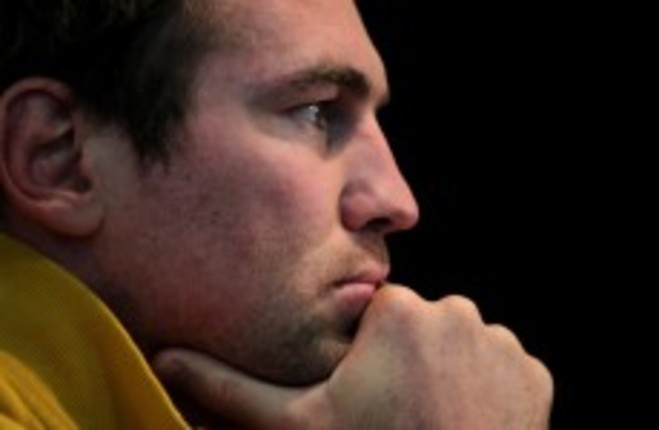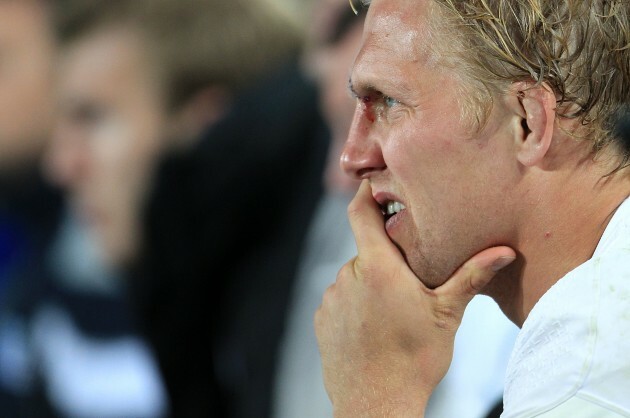WE ARE FORTUNATE enough to have witnessed some truly special individual performances during the 2011 Rugby World Cup.
And many of those players who delivered such accomplished displays featured in our team of the tournament.
On the other hand, there are of course those unfortunate few players who failed to shine, and thus made our flops of the tournament list.
So here they are, in all their ignominy:
15. Chris Paterson (Scotland)
A sad end to what has been an excellent career. Paterson missed a vital tackle that caused his side to concede a late try against Argentina and was not much better thereafter, as his side were knocked out of the tournament by England.
14. JP Pietersen (South Africa)
He could argue that he wasn’t given enough opportunities to make an impact on games on account of his side’s reliance on negative rugby, but it still does not excuse Pietersen’s total failure to exert his influence on games.
13 Anthony Fainga’a (Australia)
This tournament hasn’t exactly been blessed with great centres and Fainga’a was one example of a player who simply glided by, going through the motions when it mattered. A player performing in this manner in a game as big as the World Cup semi-final is simply inexcusable.
12. Gordon D’Arcy (Ireland)
D’Arcy has been a terrific servant to Ireland, but sadly, this World Cup will not be likely to feature in his career highlights reel. Admittedly, he looked decent against Italy, but when it mattered most, he was a virtual spectator or occasionally, a liability – missing a tackle for the Mike Philips try that cost Ireland so dearly.
11 Bryan Habana (South Africa)
Habana seems to have completely lost the flair of old and delivered what can kindly be described as a series of below-par performances in the tournament. At 28, he should be at the peak of his powers. Instead, his downfall epitomises the inadequacies of the South African team, with their over-reliance on dull, negative rugby.
10 Stephen Jones (Wales)
The former British and Irish Lions first-choice 10 has endured a steady decline of late, as emphasised by his Rugby World Cup performances. Jones initially got very little game time as he fell behind in the Welsh out-half pecking order. And when he was desperately thrown in at the deep end during their semi-final against France, he simply failed to deliver, missing some crucial kicks in the process.
9 Mike Blair (Scotland)
A very ordinary tournament from the Edinburgh player, emphasised by the fact that he was in and out of a poor Scotland side. Moreover, he practically cost his side the game against Argentina, by getting all-too-easily caught in possession, when they were on the verge of attempting a last-minute drop goal.
8 Jamie Heaslip (Ireland)
While Ireland’s forwards were outstanding in general, Heaslip, for the most part, was a notable exception. The player, who was nominated for the IRB International Player of the Year in 2009, was never particularly awful during the tournament. However, given his high standards, he will be immensely disappointed that he simply did not play with the intensity of some of his teammates.
7 Lewis Moody (England)
When you consider the amount of great 7s we haves have seen in this tournament, the England captain simply pales in comparison. Moody was almost entirely ineffectual against a beatable French team, as he patently failed to inspire a poor England side.
6 Rocky Elsom (Australia)
Elsom, so impressive during Leinster’s 2009 Heineken Cup run, looks a shadow of that player now. It was telling that he was ditched as captain before the tournament even began, and this act was a foreboding sign of things to come. When his country needed him most – against New Zealand – he was poor, and was at fault for the only try of the game.
5 Tom Palmer (England)
Performed reasonably well against the lower-tier nations, but Palmer – along with the majority of his teammates, it must be said – failed to stand up and be counted when his side were in desperate need of a leader.
4 Dan Vickerman (Australia)
Vickerman, at 32, very much looked his age at this tournament. He was a passenger for the majority of games and failed to make any impact when it mattered against teams of the calibre of New Zealand and Ireland.
3. Dan Cole (England)
Perhaps the World Cup came around too soon for the 24-year-old prop, who delivered a series of ordinary performances, as England were invariably second best at scrum time during the big games. Cole is still far from the finished article.
2. John Smit (South Africa)
By no means was it a disastrous tournament for the distinguished South African, but his days were evidently numbered on the basis of his consistently insipid performances at this tournament. It was no coincidence that South Africa almost immediately improved once he was taken off against both Wales and Australia.
1 Matt Stevens (England)
Stevens came up short against a determined French scrum in a manner that was consistent with his displays throughout the tournament. Moreover, his concession of two penalties in two minutes at the very start of the game was schoolboy stuff.
Do you agree with our choices? Let us know in the comments section below.


